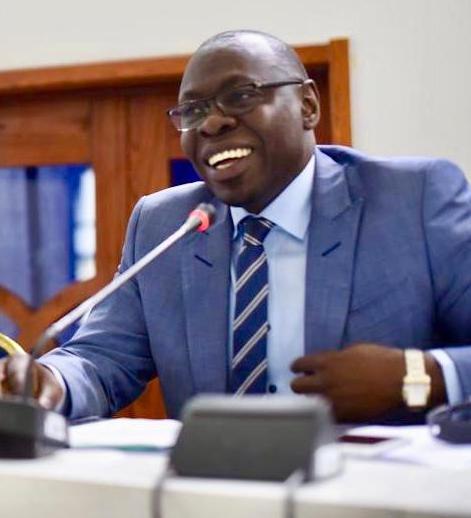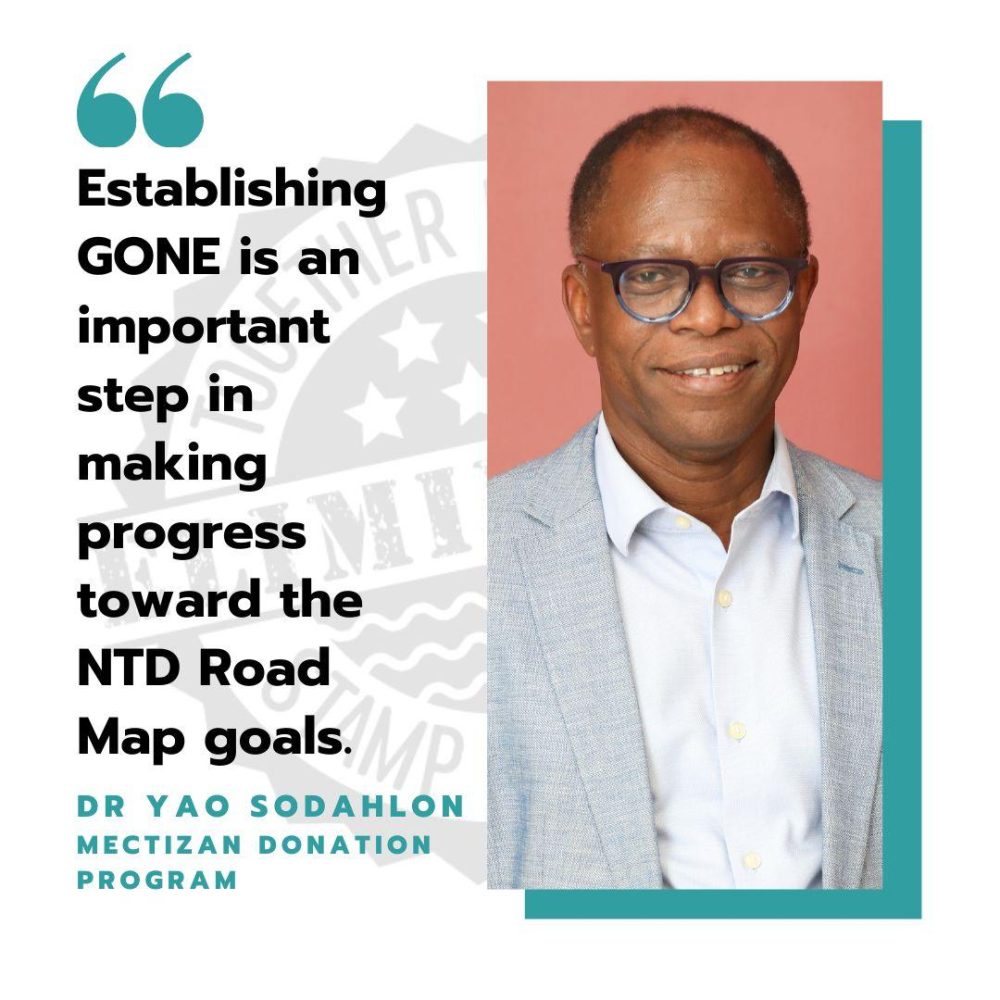This year on World Neglected Tropical Diseases Day, we celebrated the progress made thanks to Merck’s* decades-long investment through the donation of Mectizan. In 1987, Mectizan was donated “as much as needed, for as long as needed” to control river blindness. Today, not only has river blindness been controlled, both river blindness and lymphatic filariasis are targeted by the WHO 2030 NTD Road Map for elimination! But there is still much work to do. Now more than ever we must “Act Now. Act Together. Invest in Neglected Tropical Diseases.”
Our latest film highlights innovative strategies for program managers to mobilize domestic resources to support mass drug administration for river blindness and lymphatic filariasis (LF) elimination. The film also celebrates the success achieved in Malawi thanks to the government’s investment. LF was eliminated in Malawi in 2020.
Conakry meeting explores cross-border concerns
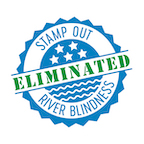 In February, Guinea hosted the 3rd meeting of its independent Onchocerciasis and Lymphatic Filariasis Elimination Expert Committee. Experts, partners, and staff of the national program convened to discuss challenges and progress towards the elimination of river blindness and LF in the Republic of Guinea.
In February, Guinea hosted the 3rd meeting of its independent Onchocerciasis and Lymphatic Filariasis Elimination Expert Committee. Experts, partners, and staff of the national program convened to discuss challenges and progress towards the elimination of river blindness and LF in the Republic of Guinea.
The Mectizan Donation Program sponsored participation from neighboring countries, including Liberia, Senegal, and Sierra Leone, to discuss cross-border issues and collaboration. MDP applauds countries for taking the initiative to strengthen cross-border collaboration to ensure synergy and coordination in their elimination efforts.
Nigeria stops treatment for river blindness in four new states
Nigeria’s Federal Ministry of Health recently announced a record-breaking decision affecting nearly 18.9 million people. After years of mass drug administration and following the required evaluations, four Carter Center-supported states (Abia, Anambra, Enugu, and Imo) are declared by the National Onchocerciasis Elimination Committee to have achieved the interruption of the transmission of river blindness, bringing the number of states in Nigeria that have stopped treatment with Mectizan to 10! This is the largest stop-treatment decision in the history of the global river blindness campaign. These four states join Delta, Kaduna, Kebbi, Nasarawa, Plateau, and Zamfara states to stop treatment for river blindness. In states where treatment for lymphatic filariasis is not ongoing or no longer needed, post-treatment surveillance will begin to confirm that transmission of the disease has truly been eliminated.
We congratulate the Nigerian Federal Ministry of Health, the National Onchocerciasis Elimination Committee (chaired by Pr. B.E.B. Nwoke, a Mectizan Expert Committee member), The Carter Center, and the people of Nigeria on this exciting achievement. Click to learn more about Nigeria’s achievement.
Good news from other countries in Africa
- Niger recently submitted its dossier to WHO to verify that river blindness has been eliminated. If WHO verifies, Niger will become the first country in Africa to be verified for elimination of transmission.
- Senegal has stopped treatment in all districts endemic for river blindness.
- Uganda has stopped treatment in all but 13 of the 146 endemic districts for river blindness.
- Malawi, Togo, and Yemen have all been validated by WHO for eliminating LF as a public health problem.
- Benin, Cameroon, Mali, and Uganda have all stopped treatment for LF in all endemic districts and are under post-treatment surveillance nationwide.
Farewell to Rachel Taylor and hello to our new colleagues at Merck & Co., Inc.
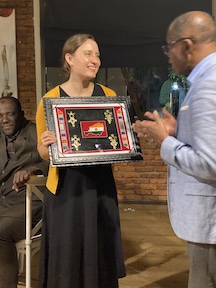
In 2023 we reluctantly bid farewell to Rachel Taylor, Director, ESG Strategy and Engagement for Merck & Co., Inc.* who was appointed as the focal point for the Mectizan Donation Program in early 2019.
Rachel’s calm presence and expertise has been an asset to MDP. Though we welcome our new focal point, Marilyn Mainardi, we will certainly miss working with Rachel.
We warmly welcome our two new connections at Merck. Allison Goldberg, Ph.D., serves as President, Merck Foundation; President, Merck Patient Assistance Program, Inc.; and Executive Director, Global Impact Giving, Social Business Innovation. Allison’s experience in global health, energy, and insights have already benefited the Mectizan Donation Program and we look forward to working with her.
As part of Allison’s team, Marilyn Mainardi, Director, Office of Social Business Innovation, now serves as the primary liaison between MDP and Merck. With many years of experience at Merck overseeing product donation programs to help expand access to medicines, vaccines, and quality health care, Marilyn is a champion for public health whose understanding of the logistics side of the Mectizan donation will make her an ideal advisor to MDP and our partners.
Welcome Dr. Ibrahima Socé Fall, WHO Director of the NTD Department
We also welcome the recent appointment of the new World Health Organization Director of the Department of Control of Neglected Tropical Diseases, Dr. Ibrahima Socé Fall. Dr. Fall steps into the shoes of the late Dr. Mwele Malecela.
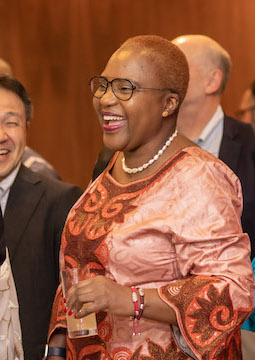
Announcing the Mwele Malecela Mentorship Program for Women in NTDs
MDP director Dr. Yao Sodahlon is proud to serve on the steering committee for the newly established Mwele Malecela Mentorship Program (MMMP) for Women in Neglected Tropical Diseases. The Mectizan Donation Program will sponsor two mentees on behalf of GSK and Merck. The two-year mentorship supports mid-career African women in their work as leaders and champions in NTDs.
The MMMP is led by WHO AFRO in collaboration with The End Fund and the American Society for Tropical Medicine & Hygiene. Applications for the next cohort will be due in early 2024.
WHO Launches the Global Onchocerciasis Network for Elimination (GONE)

Partner spotlight: Ugandan community thrives in the absence of river blindness
A recent report from our NGO partner The Carter Center spells out the economic benefits of investing resources to end NTDs:
“The decline of river blindness has changed everything…. Crops can be planted in fertile lands near the fast-flowing rivers and streams now; people are healthier and more productive; children can go to school instead of staying home to help blinded family members.”
*Merck & Co., Inc., Rahway, New Jersey USA, is known as MSD outside the United States and Canada.
MDP oversees the donation of Mectizan® by Merck & Co., Inc., Rahway, New Jersey, USA to eligible countries where river blindness and lymphatic filariasis are endemic. Merck & Co., Inc. is known as MSD outside the United States and Canada. For the elimination of LF where onchocerciasis is co-endemic in Africa and Yemen, Mectizan is co-administered with albendazole, donated by GSK. In countries eligible for “triple therapy,” where onchocerciasis is not endemic, Mectizan and albendazole are co-administered with diethylcarbamazine (DEC) to accelerate LF elimination in some communities.

